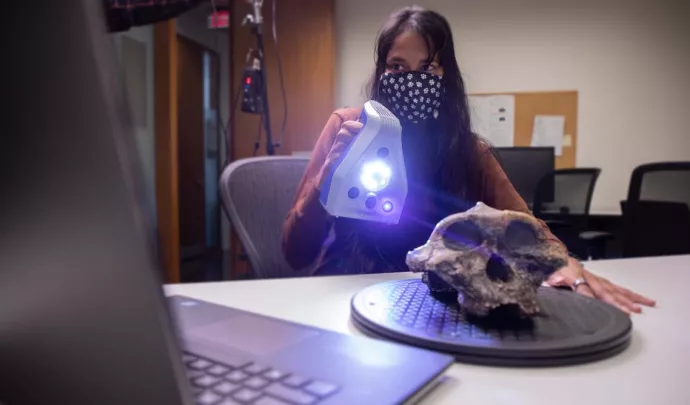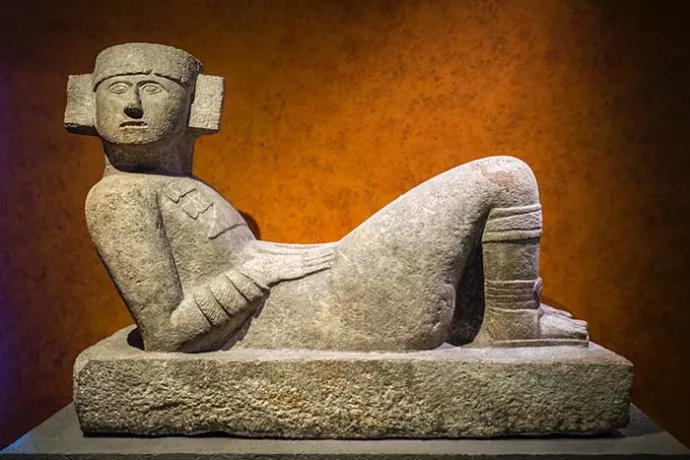
As an Anthropology student at UTM, you join a thriving community of educators, researchers and students who are continually redefining our understanding of humankind. Together we not only ask big questions – What does it mean to be human? – but we also apply our knowledge and know-how to address some of today’s most pressing challenges.
On this page:
- What is Anthropology?
- Quick facts about Anthropology at UTM
- What makes these Anthropology programs distinctive?
- Arts and Science Undergraduate programs
- Career opportunities
- Events
- Additional resources
What is Anthropology?
“Anthropology is the most humanistic of sciences and the most scientific of the humanities” ~ Anthropologist Alfred L. Kroeber (1876-1960).
Anthropology is the study of humankind from its beginnings to the present day. As described in the Discover Anthropology website (operated by the Royal Anthropological Institute’s Education Outreach Programme), anthropology is "concerned with the biological features that make us human" which includes "physiology, genetic makeup, nutritional history and evolution". It also deals with the social elements, which include "language, culture, politics, family and religion." In addition, whether they study a "religious community in London, or human evolutionary fossils in the UAE, anthropologists are concerned with many aspects of people’s lives: the everyday practices as well as the more dramatic rituals, ceremonies and processes which define us as human beings."
Did you know?
- Anthropologists find rewarding careers in governmental and international agencies, business and industry, universities and colleges, and many other areas!
- The word anthropology is derived from the Greek anthropos ("human") and logia ("study").
- Nothing human is alien to anthropology!
Quick facts about Anthropology at UTM
- University of Toronto including UTM is the highest-ranked Canadian university and number 12 in the world for the subject of anthropology in the 2025 QS World University Rankings by Subject.
- University of Toronto including UTM is the highest-ranked Canadian university for graduate employability according to the 2022 QS Graduate Employability Rankings.

What makes these Anthropology programs distinctive?
Our goal as a department is to train our students in the fundamentals of all the subfields. We aim to produce students who are curious about the world in its complexity, who can critically assess the human condition, and who are well versed in the skills, theories, and databases of anthropology. Students can earn either HBA or HBSc degrees, providing many flexible career options.
An excellent foundation for many graduate and professional pathways
UTM's interdisciplinary Anthropology programs can prepare you for further education in:
- Law
- Health care
- Teaching
- Business
- Journalism
- and more
Additionally, in an increasingly technological and global world, having human-centred scientific and cultural knowledge can complement almost any other fields of study that you choose to pursue. Our programs pair well with many other disciplines for a double major or other combination. Below are some common program combinations, but Anthropology intersects with so many areas that you can combine our programs with nearly anything else you choose to study.
To learn more, visit our Alumni Profiles page, as well as the Double Majors section of the Program Information page.
Diverse and broad selection of courses
From The Social Conquest of Earth; to Sex, Evolution and Behaviour; and Racketeers, Smugglers and Pirates: Anthropology of Illegality — Anthropology courses at UTM truly offer 'something for everyone'.
UTM offers courses in all four traditional subfields of Anthropology:
We also have strengths in:
- Forensic anthropology
- Anthropology of health
- Politics, policy & law (PPL)
- Generalist anthropology: studying generalist anthropology as part of your undergraduate anthropology program at UTM will give you a broad grounding in the various subfields of anthropology for maximum career flexibility.
A lush campus and strong sense of community
- In addition to the program and department, as an Anthropology student at UTM, you'll be immersed in a truly extraordinary campus experience.
- You'll be attending informative lectures and tutorials taught by the world-class educators that you'd expect from Canada's largest and most acclaimed university.
- At the same time, you'll also enjoy the down-to-earth sense of community that a campus – situated on 225 acres of lush, protected greenbelt – can provide.
- This lush natural setting is coupled with modern architecture, award-winning buildings and state-of-the art technology — providing students with a distinctive learning experience.
- Our students also benefit from the safety and inclusiveness of a tight knit campus which offers a wide variety of student groups, clubs, and activities for all interests.
Field schools offered directly on campus
The Forensic Anthropology Field School course (ANT306H5F) is an introduction to the field of forensic anthropological field techniques and scene interpretation. Topics covered include crime scene protocols and record keeping, searching for human remains and clandestine burials, mapping small scenes and more.
The UTM Archaeological Fieldwork course (ANT318H5F) offers students a basic grounding in the techniques and methods employed by archaeologists to extract data from an archaeological site and to process these data in the laboratory.
Arts and Science Undergraduate programs
You can combine our courses in many different ways to complete a program for an Honours Bachelor of Arts (HBA) or Honours Bachelor of Science (HBSc) degree.
- Learn about Anthropology Arts undergraduate programs at the University of Toronto Mississauga.
- Learn about Anthropology Science undergraduate programs at the University of Toronto Mississauga.
- See the UTM Academic Calendar for all program details.
Career opportunities
The skills and proficiencies you acquire while studying Anthropology at UTM will benefit you in any career you might enter. Anthropology graduates bring a unique and valuable combination of cultural awareness, communication, analytical, and problem-solving skills to many diverse career areas in an increasingly global job market.
While not exhaustive, here's a list of career options that are available to you as a graduate of the Anthropology program (some require further education and experience):
- Paleontologist
- Archaeologist
- University Professor
- Market Research Analyst
- Forensic Scientist
- Museum Technician
- Ethnographer
- Multicultural Education Specialist
- Human Resources Specialist
- Program Director
- Refugee Services Coordinator
- Survey Researcher
- Project Development Officer
- Epidemiologist
- Conservator
- Lobbyist
- Rural Development Officer
- Coroner/Medical Examiner
- Linguist
- Public Health Educator
- Federal Government Policy Analyst
- Policy Scientist
- Community Worker
- Foreign Service Officer
- Kinesiologist
- Social Worker
- ESL Teacher
- Archivist
Visit our Careers page for more information on career areas for anthropology graduates.
Events
Information sessions and drop-in lab events for prospective students will be posted on our Events page when they are scheduled. Events include Fall Campus Day and March Open House.
Additional resources
- How anthropology can help you achieve your academic and career goals: read our student profiles
- Program enrollment information: visit our Undergraduate Program Information page for information on enrolling in Anthropology Arts and Science programs at UTM
- Information for future UTM students
- If you have questions about our programs, please email the UTM Anthropology Academic Advisor & Undergraduate Program Administrator at utm.anthro@utoronto.ca
